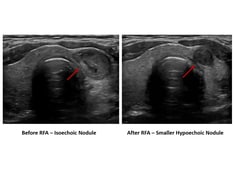Nearly one in five individuals with cancer who are treated with immune checkpoint inhibitors develop thyroid dysfunction, new research suggests.
Immune checkpoint inhibitors have revolutionized the treatment of many different types of cancers, but can also trigger a variety of immune-related adverse effects. As these drugs become more widely used, rates of these events appear to be more common in the real-world compared with clinical trial settings.
In their new study, Zoe Quandt, MD, of the University of California, San Francisco (UCSF), and colleagues specifically looked at thyroid dysfunction in their own institution's electronic health record data and found more than double the rate of hypothyroidism and more than triple the rate of hyperthyroidism compared with rates in published trials.
Moreover, in contrast to previous studies that have found differences in thyroid dysfunction by checkpoint inhibitor type, Quandt and colleagues instead found significant differences by cancer type.
Quandt presented the findings during a virtual press briefing held March 31 originally scheduled for ENDO 2020.
"Thyroid dysfunction following checkpoint inhibitor therapy appears to be much more common than was previously reported in clinical trials, and this is one of the first studies to show differences by cancer type rather than by checkpoint inhibitor type," Quandt said during her presentation.
However, she also cautioned that there's "a lot more research to be done to validate case definitions and validate these findings."
Asked to comment, endocrinologist David C. Lieb, MD, associate professor of medicine at Eastern Virginia Medical School in Norfolk, told Medscape Medical News, "These drugs are becoming so much more commonly used so it's not surprising that we're seeing more endocrine complications, especially thyroid disease."
"Endocrinologists need to work closely with oncologists to make sure patients are being screened and followed appropriately."
"A Much Higher Percentage Than We Were Expecting"
Quandt's study included 1146 individuals treated with checkpoint inhibitors at UCSF between 2012 and 2018 who did not have thyroid cancer or pre-existing thyroid dysfunction.
Pembrolizumab was the most common treatment (45%), followed by nivolumab (20%). Less than 10% of patients received atezolizumab, durvalumab, ipilimumab monotherapy, combined ipilimumab/nivolumab, or other combinations of checkpoint inhibitors.
A total of 19.1% developed thyroid disease, with 13.4% having hypothyroidism and 9.5% hyperthyroidism. These figures far exceed those found in a recent meta-analysis of 38 randomized clinical trials of checkpoint inhibitors that included 7551 patients.
"Using this approach, we found a much higher percentage of patients who developed thyroid dysfunction than we were expecting," Quandt said.
In both cases, the two categories — hypothyroidism and hyperthyroidism — aren't mutually exclusive as hypothyroidism can arise de novo or subsequent to hyperthyroidism.
Lieb commented, "It would be interesting to see what the causes of hyperthyroidism are — thyroiditis or Graves disease."
Quandt mentioned a possible reason for the large difference between clinical trial and real-world data.
"Once we're actually using these drugs outside of clinical trials, some of the restrictions about using them in people with other autoimmune diseases have been lifted, so my guess is that as we give them to a broader population we're seeing more of these [adverse effects]," she suggested.
Also, "In the initial trials, people weren't quite as aware of the possibilities of these side effects, so now we're doing many more labs. Patients get thyroid function tests with every infusion, so I think we're probably catching more patients who develop disease."
New Finding: Differences by Cancer Type, Not Checkpoint Inhibitor Type
And in a new twist, Quandt found that, in contrast to the differences seen by checkpoint inhibitor type in randomized trials, "surprisingly, we found that this difference did not reach statistical significance."
"Instead, we saw that cancer type was associated with development of thyroid dysfunction, even after taking checkpoint inhibitor type into account."
The percentages of patients who developed thyroid dysfunction ranged from 9.7% of those with glioblastoma to 40.0% of those with renal cell carcinoma.
The reason for this is not clear, Quandt said when asked by Medscape Medical News.
One possibility relates to other treatments patients with cancer also receive. In renal cell carcinoma, for example, patients are also treated with tyrosine kinase inhibitors, which can also cause thyroid dysfunction, so they may be more susceptible. Or there may be shared antigens activating the immune system.
"That's definitely one of the questions we're looking at," she said.
Quandt and Lieb have reported no relevant financial relationships.
ENDO 2020. Abstract SAT-418. March 31, 2020.
For more diabetes and endocrinology news, follow us on Twitter and Facebook.
Medscape Medical News © 2020 WebMD, LLC
Send comments and news tips to news@medscape.net.
Cite this: 20% With Cancer on Checkpoint Inhibitors Get Thyroid Dysfunction - Medscape - Apr 01, 2020.










Comments